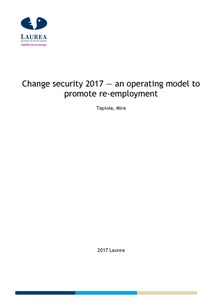Change security 2017 : an operating model to promote re-employment
Tapiola, Mira (2017)
Tapiola, Mira
Laurea-ammattikorkeakoulu
2017
All rights reserved
Julkaisun pysyvä osoite on
https://urn.fi/URN:NBN:fi:amk-201703183450
https://urn.fi/URN:NBN:fi:amk-201703183450
Tiivistelmä
The main objective of the thesis is to investigate how companies will support laid-off employees, from January 1, 2017 when the reformed change security operating model came into force, and how they intend to support them in the future. Another objective is to study what kind of support businesses or organizations need so that they can fulfill all the change security actions required in the legislation. Finally, the author wants to gather information about what kind of support the HR managers, managers, and directors think individuals need in dismissal situations. The case company HRM Partners Oy needs this information in order to understand better the changing market.
The theoretical section defines the essential content of the previous change security legislation and presents how the reformed change security measures will affect employers and employees. It also describes the functionality and statistics of the change security effects.
The empirical part of this thesis project was carried out between November 14 and November 22, 2016 using a quantitative research method: an online survey. The study targeted all managerial employees in HRM Partners’ customer register. A total of 1,195 questionnaires were sent to managerial employees such as HR and other managers. 235 responses were received. To achieve a confidence level of 95% and a 6% margin of error, 219 was the required sample.
The results indicate that outplacement training and services provided by the TE Office are still highly valued. However, other support activities such as job seeking and job matching help on the part of the laid off employee’s company as well professional and other types of education are becoming more important. Furthermore, services offered through a combination of face-to-face coaching and the network are valued more than those offered online.
Since the legislation reform is relatively new, the content of the reformed change security legislation is largely unknown and it leaves room for interpretation. The change security training and coaching regulation is completely semidispositive, which means that agreements between parties may defer part of the law. Only time will tell how the reformed legislation will be applied in the future.
Further research is recommended to better understand the impact and effectiveness of the reformed change security measures on the individual and the entire economy. However, some time must pass before such research can be conducted.
The theoretical section defines the essential content of the previous change security legislation and presents how the reformed change security measures will affect employers and employees. It also describes the functionality and statistics of the change security effects.
The empirical part of this thesis project was carried out between November 14 and November 22, 2016 using a quantitative research method: an online survey. The study targeted all managerial employees in HRM Partners’ customer register. A total of 1,195 questionnaires were sent to managerial employees such as HR and other managers. 235 responses were received. To achieve a confidence level of 95% and a 6% margin of error, 219 was the required sample.
The results indicate that outplacement training and services provided by the TE Office are still highly valued. However, other support activities such as job seeking and job matching help on the part of the laid off employee’s company as well professional and other types of education are becoming more important. Furthermore, services offered through a combination of face-to-face coaching and the network are valued more than those offered online.
Since the legislation reform is relatively new, the content of the reformed change security legislation is largely unknown and it leaves room for interpretation. The change security training and coaching regulation is completely semidispositive, which means that agreements between parties may defer part of the law. Only time will tell how the reformed legislation will be applied in the future.
Further research is recommended to better understand the impact and effectiveness of the reformed change security measures on the individual and the entire economy. However, some time must pass before such research can be conducted.
